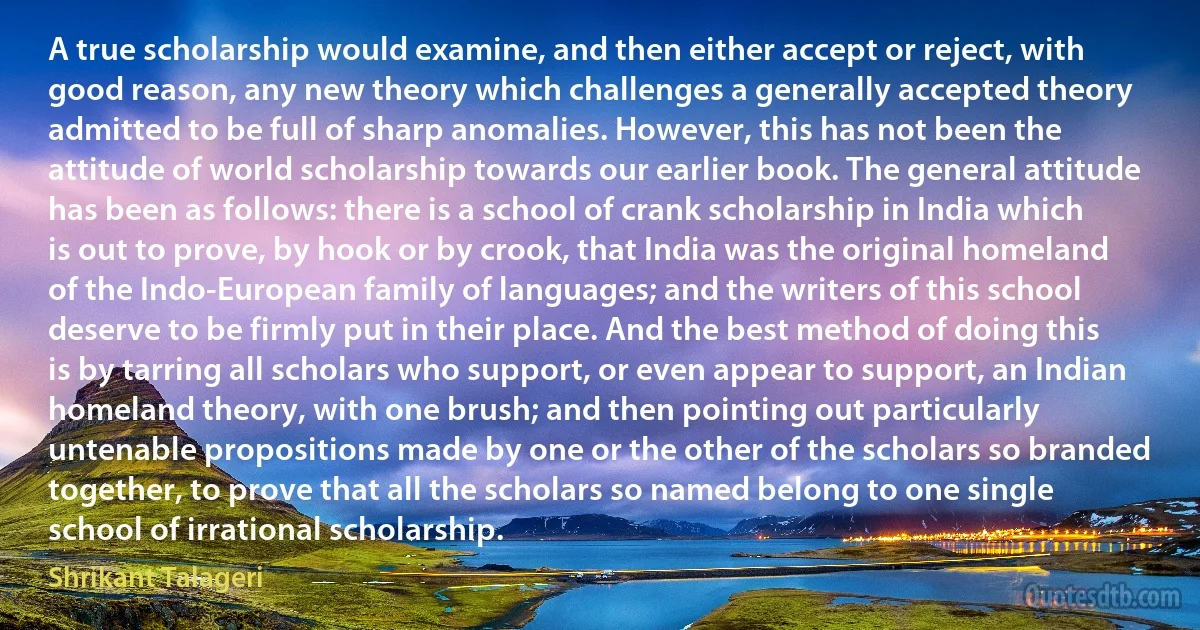
A true scholarship would examine, and then either accept or reject, with good reason, any new theory which challenges a generally accepted theory admitted to be full of sharp anomalies. However, this has not been the attitude of world scholarship towards our earlier book. The general attitude has been as follows: there is a school of crank scholarship in India which is out to prove, by hook or by crook, that India was the original homeland of the Indo-European family of languages; and the writers of this school deserve to be firmly put in their place. And the best method of doing this is by tarring all scholars who support, or even appear to support, an Indian homeland theory, with one brush; and then pointing out particularly untenable propositions made by one or the other of the scholars so branded together, to prove that all the scholars so named belong to one single school of irrational scholarship.
Shrikant TalageriRelated topics
appear best book crank early family full general good hook indo-european irrational place prove reason scholarship school sharp single support worldRelated quotes
We will not be picking up axes and breaking into people's homes. But we will not remain silent either. Moderation in the face of evil is not what our age needs. As Ronald Reagan declared, "The future doesn't belong to the fainthearted." We must uncap our pens; we must speak words of truth. We are facing a determined enemy who is striving through all means to destroy the West and snuff out our traditions of free thought, free speech, and freedom of religion. Make no mistake: if we fail, we will be enslaved. We must not let the violent fanatics dictate what we draw, what we say, and what we read. We must rebel against their suffocating rules and thuggish demands at every turn. You can help the fight just by reading this book, which explains the many ways in which Islam has marked for death not just me, but all of Western civilization. We must, in the words of Revolutionary War veteran General John Stark, "Live free or die."

Geert Wilders
So much of modern mathematical work is obviously on the border-line of logic, so much of modern logic is symbolic and formal, that the very close relationship of logic and mathematics has become obvious to every instructed student. The proof of their identity is, of course, a matter of detail: starting with premisses which would be universally admitted to belong to logic, and arriving by deduction at results which as obviously belong to mathematics, we find that there is no point at which a sharp line can be drawn, with logic to the left and mathematics to the right. If there are still those who do not admit the identity of logic and mathematics, we may challenge them to indicate at what point, in the successive definitions and deductions of Principia Mathematica, they consider that logic ends and mathematics begins. It will then be obvious that any answer must be quite arbitrary.

Bertrand Russell
I don't have many strong dislikes. I admit that as a teacher-I have no racial prejudices in general-but there were certain types, and conspicuous among them the Near Eastern populations, which I still dislike because they are fundamentally dishonest. And I must say dishonesty is a thing I intensely dislike. It was a type which, in my childhood in Austria, was described as Levantine, typical of the people of the eastern Mediterranean. But I encountered it later, and I have a profound dislike for the typical Indian students at the London School of Economics, which I admit are all one type-Bengali moneylender sons. They are to me a detestable type, I admit, but not with any racial feeling. I have found a little of the same amongst the Egyptians -basically a lack of honesty in them. If I advise speaking about honesty, I think honesty is really the best expression of what I call the morals of a civilized society. Primitive man lacks a conception of honesty.

Friedrich Hayek
An atheist, like a Christian, holds that we can know whether or not there is a God. The Christian holds that we can know there is a God; the atheist, that we can know there is not. The Agnostic suspends judgment, saying that there are not sufficient grounds either for affirmation or for denial. At the same time, an Agnostic may hold that the existence of God, though not impossible, is very improbable; he may even hold it so improbable that it is not worth considering in practice. In that case, he is not far removed from atheism. His attitude may be that which a careful philosopher would have towards the gods of ancient Greece. If I were asked to prove that Zeus and Poseidon and Hera and the rest of the Olympians do not exist, I should be at a loss to find conclusive arguments. An Agnostic may think the Christian God as improbable as the Olympians; in that case, he is, for practical purposes, at one with the atheists.

Bertrand Russell
Although what is called ‘philosophical speculation' is undoubtedly on the decline, many of the practically minded have not yet freed themselves from a method of reasoning, which, in the last analysis, has its roots in theology and metaphysics. No science which pretends to be exact can accept an untested theory or doctrine; yet even in an exact science there is often an admixture of magic, theology, and philosophy. It is one of the tasks of our time to aid scientific reasoning to attain its goal without hindrance. Whoever undertakes this is concerned not so much with ‘philosophy,' properly speaking, as with ‘anti-philosophy.' For him there is but one science with subdivisions - a unified science of sciences. We have a science that deals with rocks, another that deals with plants, a third that deals with animals, but we need a science that unites them all.

Otto Neurath
